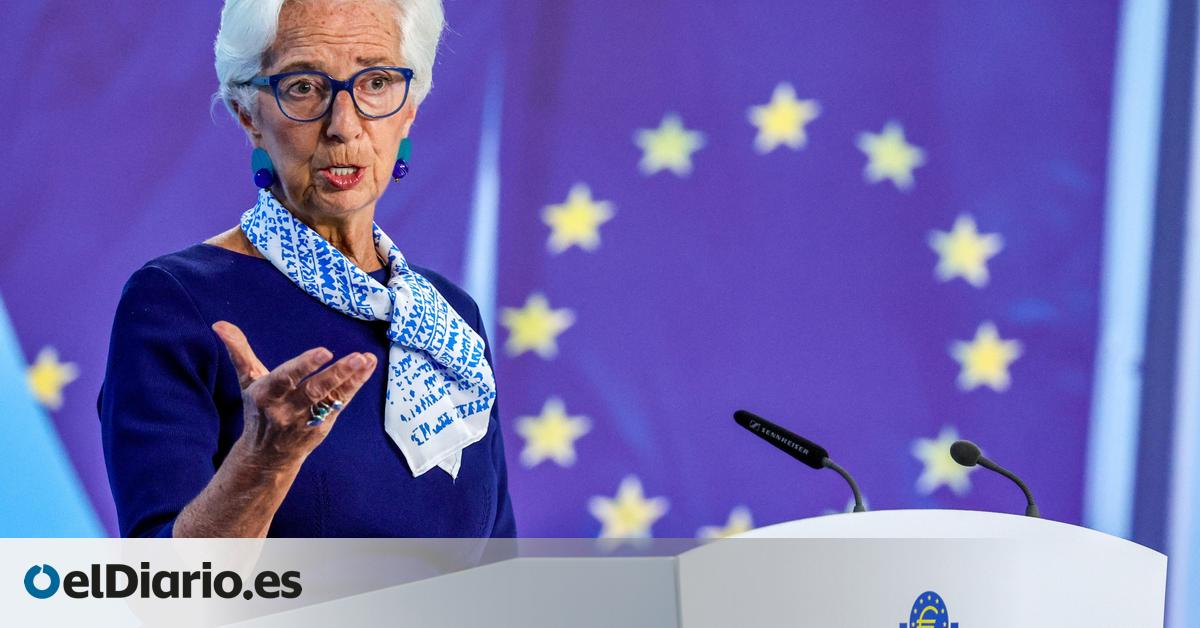
The European Central Bank left interest rates without changes in 2%, despite the institutional crisis of France and the lousy behavior of the German economy. There were no surprises in Frankfurt, where a monetary policy of observation and analysis that leads to some paralysis has been imposed. The president of the monetary institution, Christine Lagarde, is comfortable in the supposed neutral zone and preference, backed by the most aggressive members, is to leave the types without further changes until the uncertainties are clearing.
With inflation in 2.1% in the euro zone the ECB could spur a little more to the economy with a decrease in a quarter point but they remain old arguments for a static position: the war of Ukraine and the tensions of Europe with Russia or the still unclear consequences of the tariff trade agreement between the United States and the EU. However, certainties do not seem to influence so strongly on the road designed by the monetary institution.
We already know that in the second quarter of 2025, GDP increased only 0.1 % in the euro zone, compared to the previous quarter, according to Eurostat. It must be remembered that in the first three months of the year the economy of the euro zone grew by 0.6 %. And in this anemic economic growth of a tenth, he throws a lot of the lousy situation in Germany, whose economy fell 0.3% in the second quarter of the year, giving evidence that it is necessary to give an impulse to recover a dynamism caught by pins.
In fact, the hope that consumption relieves the situation is not entirely clear, which should lead to the ECB to try to make citizens and companies have more money in their pockets to spend. Matthew Ryan, head of Ebury Market Strategy, admits that “it is not known to what extent the increase in public spending in Germany will boost the European economy, but we do not expect this impulse to manifest itself in the data until 2026”.
What seems to be the strategy that is imposed on the offices that govern the destinations of monetary policy? Michael Browne, a global investment strategist of Franklin Templeton Institute, points out that everything points to “simply, falling the situation until 2027 and trusting that economic improvement in Europe, driven by German Chancellor Mertz, generates sufficient growth to compensate for the risk of taking two years without new budgets.”
On the other hand there is the difficult institutional and economic situation of France: a country with a fiscal deficit greater than 5% and a GDP debt of 116% increasing and a political crisis of enormous dimensions. The country’s institutional crisis caused the expansion of the differential of the public debt of France and Germany to take off from 65 to 80 basic points in the 10-year bonds and an even more probable degradation of the agencies of the credit rating of France to a simple medium-term ‘A’ Credit Qualification is already being discounted, according to Geoffrey Lenoir, Co-CiCo de Oph Invest AM.
Despite this situation, France worries but does not alter the ECB’s plans. Among other things, according to Aline Goupil-Alguénès, a strategist of developed countries of Ostrum AM, because “there are several factors that contribute to the strong demand for French bonds. First of all, the French bond market is one of the most liquid and deep in the euro zone, which makes it an attractive market for investors. Second non -payment of your debt. ”
What are the possible scenarios that could lead to the ECB to take exceptional measures? There are two elements: that the political crisis is further complicated and the president of France, Emmanuel Macron, present the resignation or that “the infection effect in the highly indebted peripheral countries was significant, which would lead to the ECB to intervene activating its instrument of transmission protection to” combat the unjustified and disorderly market dynamics that suppose a serious threat to the transmission of the monetary policy in the monetary policy in the area of the euro, Add Goupil-Alguénès. Although Ostrum AM’s own analyst recalls that “it is unlikely that the ECB use the TPI to limit tensions about the French differential, since France is in a situation of excessive deficit and must adhere to the recommendations of the European Commission to benefit from the TPI.”
In addition, the ECB has published its new economic projections that foresee an economy growth of 1.2 % in 2025, upward revised from 0.9 % planned in June. The growth projection for 2026 is now slightly lower, of 1.0 %, while the projection by 2027 remains unchanged in 1.3 %. The new forecasts have an inflation panorama similar to that projected in June: an average general inflation of 2.1% in 2025, 1.7% in 2026 and 1.9% in 2027.
Source: www.eldiario.es

